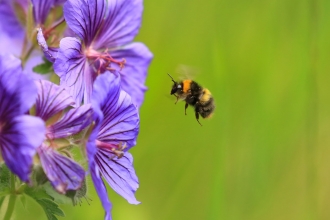Devon Wildlife Trust (DWT), The Wildlife Trusts (TWTs), experts and hundreds of thousands of people have repeatedly called for the ban of deadly neonicotinoids, that was brought in in 2017, to be upheld. It has taken time and persistence, but we are delighted with the government decision this week to uphold the ban of a substance that is so devastating for our insects.
Pesticide emergency authorisation denied for 2025 to protect bees - GOV.UK
So, what was the problem?
Neonicotinoids (NNs) were banned for agricultural use in the UK and the EU in 2017 due to their devastating impact on bees. Even minute traces of these toxic chemicals in crop pollen or wildflowers can interfere with bees’ ability to forage and navigate, leading to catastrophic consequences for colony survival. Recent scientific studies demonstrated that even one exposure to a neonicotinoid insecticide can significantly reduce bees’ ability to produce offspring in future years 1.
However, on 8th January 2021, the UK Government allowed UK farmers to treat sugar beet seed with the banned substance thiamethoxam – a neonicotinoid – as an emergency measure against the beet yellows virus. This decision contradicted scientific guidance and environmental commitments made in the government’s 25-Year Environment Plan.
A pattern of poor decisions
DWT and TWTs responded swiftly to this decision, launching a petition signed by over 100,000 people and threatening legal action. But the many voices of people who care about this issue were ignored. The ‘emergency measure’ went ahead and, every year since, the government has allowed the use of thiamethoxam on sugar beet in England. This is despite the advice of government scientific advisors, despite its own environmental commitments, and despite campaigning by DWT, TWTs and others.
Great news
But finally, the ban has been upheld, which is great news for insects and great news for all the people and businesses that rely on them. As DWT’s CEO, Nick Bruce White, says:
“For many years, both the scientific evidence and the voices of hundreds of thousands of nature lovers have been telling governments that there is no place for highly toxic bee-killing pesticides in our farmed landscapes. We are in a nature and climate crisis, with pollution of our precious environment of deep concern to so many people. So we are delighted that the UK Government has finally decided to say ‘no to neonics’ and keep a ban in place for 2025.
With many farmers already having turned their backs on these devastating chemicals, it’s time now for the industry and government to properly support farmers in a full transition away from harmful pesticides. Allowing nature to recover not only brings a buzz back to our countryside, it underpins the very future of food production.”
Joan Edwards, Director of Policy and Public Affairs at TWTS, says:
“The focus must now be on a complete, sustainable transition away from a reliance on the use of neonicotinoids not just in agriculture, but also in pet flea treatments. This is a key source of chemical pollution in our waterways, with 10% of UK rivers found to contain toxic neonicotinoid chemicals.”
A Path Forward
Insects are the foundation of our ecosystems, yet they are in steep decline due to habitat loss and pesticide use. Ignoring their plight risks devastating consequences for the natural world and food production systems that rely on healthy pollinator populations.
We strongly believe that:
- Farmers should not have to choose between making a living and protecting nature.
- Nature-friendly farming requires proper investment and support for sustainable methods such as integrated pest management and agroecological approaches.
- Granting of “emergency” permissions for banned substances like neonicotinoids is a short-sighted solution that harms nature, people, and the future of farming itself.
The recent decision to uphold the neonicotinoid ban represents a significant victory for wildlife, but the focus must remain on supporting farmers in transitioning to sustainable nature friendly practices. Together, we can work towards a future where people and nature thrive together, free from the devastating impact of toxic chemicals.
Find out how you can help take Action for Insects here
References
1. Woodcock et al., 2017 publication Nature Communications examined how exposure to neonicotinoid-treated crops impacts bee colonies over time. This study found that even small exposures to these chemicals can significantly impair reproduction and reduce colony growth and survival in subsequent years by Woodcock et al., which examined how exposure to neonicotinoid-treated crops impacts bee colonies over time. This study found that even small exposures to these chemicals can significantly impair reproduction and reduce colony growth and survival in subsequent years.
Proceedings of the Royal Society B (2016) by Rundlöf et al., investigated the sub-lethal effects of neonicotinoids on solitary and social bees. They observed that neonicotinoids negatively affected the reproductive success of solitary bees, and for honeybees, it reduced overall colony health, including queen production.




